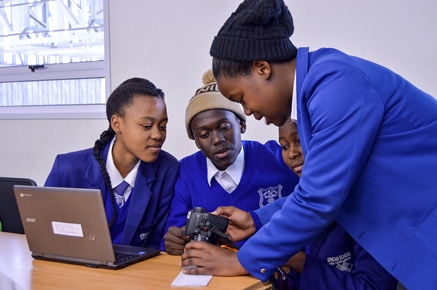Digital solutions can address African school system
Africa’s population is 1,5 billion today, 70% of which is under 30 years old, making it the world’s youngest. Yet, in the sub-Saharan region only, 98 million children are currently out-of-school. Not to mention another 72 million young people, aged from 15 to 24, who are neither trained nor employed: two thirds of them are women.
A new report by Boston Consulting Group (BCG), titled “Boosting education technology in Africa: scaling innovation for the future of education,” explores how digital solutions can address the main challenges faced by the African school system: a pressing question, as over one billion children will be living on the continent by 2055.
Why this report matters now
- 98 million children in Sub-Saharan Africa are currently out-of-school, and 72 million young people aged 15 to 24 are neither trained nor employed—two thirds of them women.
- In this context, scalable digital solutions—such as mobile platforms and AI-powered learning applications—offer a unique opportunity to deliver quality education tailored to local needs, even in remote or underserved areas.
- Over 400 EdTech startups have developed across Africa, with half located in just three countries: Nigeria, South Africa, and Kenya.
Spotlight on Kenya and Nigeria:
- Kenya’s Eneza Education has reached 5 million remote learners using basic mobile phones, demonstrating how technology can overcome infrastructure gaps and improve exam results.
- Nigeria is a continental leader in EdTech startup activity. Homegrown platforms like uLesson have raised $26.5 million, garnered over 3.5 million app downloads, and delivered more than 12 million educational videos—vastly expanding access to high-quality K-12 content.
- Despite such success stories, most EdTech startups face funding gaps, a shortage of accelerators, and struggle to scale due to Africa’s linguistic diversity and regulatory inconsistencies. More than 70% of EdTech founders are men, highlighting the need for greater gender inclusion.
Key findings and solutions from the BCG report:
- Clear government strategy: National policies (like Rwanda’s ICT policy) can create the conditions for EdTech to thrive.
- Business-user alignment: EdTech solutions must match real-world workforce and learner needs.
- Increased funding: Development finance, venture capital, and public-private partnerships can help EdTech scale as successfully as fintech has.
- Pan-African accelerators: More mentorship, funding, and cross-border networking are crucial for regional growth.
RELATED: Driving digital transformation in emerging economies through media, fintech & edtech
Fast-tracking education change with digital solutions
Technology can strengthen education at all levels, starting from early childhood to adult training. The BCG analysis indicates, through multiple examples, the different ways in which digital solutions can be more inclusive, as they deliver scalable, cost-effective means to reach all populations. For instance, Sayna, a Malagasy provider of gamified courses in tech skills, connects its learners to lucrative IT micro-tasks. Another case is that of the Kenyan platform Eneza Education, which has hit five million users living in remote areas through basic phones, improving exam scores by 5%.
“These statistics could grow, should Africa’s digitalisation expand,” says Badr Choufari, education, employment, and welfare lead, as well as managing director and partner at BCG Casablanca. “Projections are encouraging: mobile penetration is expected to reach 51% in 2025, which is quite impressive, as it was only 3% in 2010.”
Edtech in Africa needs a boost
Technology seems to be Africa’s most powerful tool for promoting education. However, three different challenges are looming.
First, even though more than four hundred EdTech start-ups have developed throughout the continent, half of them are located in only three countries (Nigeria, South Africa and Kenya).
Moreover, some segments need reinforcement. Around 64% of EdTech startups in Africa serve K-12 levels, while fewer address higher education and professional skills. In contrast, North American EdTech startups emphasise workforce training and higher education more heavily, with only about 25% focusing on K-12, about 50% targeting vocational and workforce learning, and the remainder 25% serving higher education.
Finally, funding is still a major issue, as EdTech accounts for only 4% of African-tech fundraising. Startup development is impaired: between 2010 and 2021, the gap in the creation of new EdTech startups widened by a factor of seven relative to FinTech and doubled compared to AgTech. “Not to mention that, despite the sector’s potential, more than 70% of EdTech companies are founded by men, highlighting a significant gender gap in leadership,” adds Choufari.
The BCG report also highlights the fact that this slow progression is further compounded by the dominance of very early-stage start-ups: more than half of African EdTech startups are at the pre-seed stage. Only 13% reach the seed stage. The landscape is very different in countries like India or the USA that benefit from a more balanced distribution across funding stages.
“Scaling EdTech in Africa will take bold collaboration—between governments, investors, and local innovators. This is not just a technology challenge; it is a systems challenge. What is at stake is how we prepare the next generation for the future of work,” says Mills Schenck, Managing Director and Senior Partner at BCG Nairobi.
Scaling Edtech in Africa: four solutions worth trying
However, Africa’s EdTech sector has the capacity to improve its scaling results, should it rely on sufficient funding, but also on efficient policies and collaborative networks. The report emphasises several key levers to unlock Africa’s EdTech potential:
- Government vision and policy: domestic strategies, such as active sourcing, technology grants and subsidies, could generate a hospitable environment encouraging EdTech’s expansion. Rwanda’s ICT policy should set an example: it aims to extend connectivity nationwide, thus integrating digital tools to classrooms, reinforcing teacher training and spreading student access to programmes. Though recent, its impact can already be measured.
- Business and users’ alignment: both organisations and users should understand their mutual requirements for EdTech solutions to be tailored to meet needs on both ends. To that extent, developers and entrepreneurs can get inspiration from a platform like Skills Future Singapore that matches workforce demands with education outputs.
- Increased funding: Development finance institutions (DFIs) have supported African FinTech startups. Similar initiatives could foster the rise of EdTech companies, as well as public-private partnerships, donor programmes or venture capital. All of these could in turn create professional openings.
- Pan-African accelerators: Africa has very few accelerators dedicated to EdTech, among which Injini or iHub. But increasing mentorship, funding, and networking efforts could promote cross-border growth
“Technology can help Africa leapfrog long-standing barriers in education. But to unlock its full potential, we must close the funding gap, invest in inclusive innovation, and champion homegrown solutions tailored to Africa’s unique needs,” says Sylvia Mwangit Partner at BCG Nairobi and co-author of the report.
Download the publication here.






























